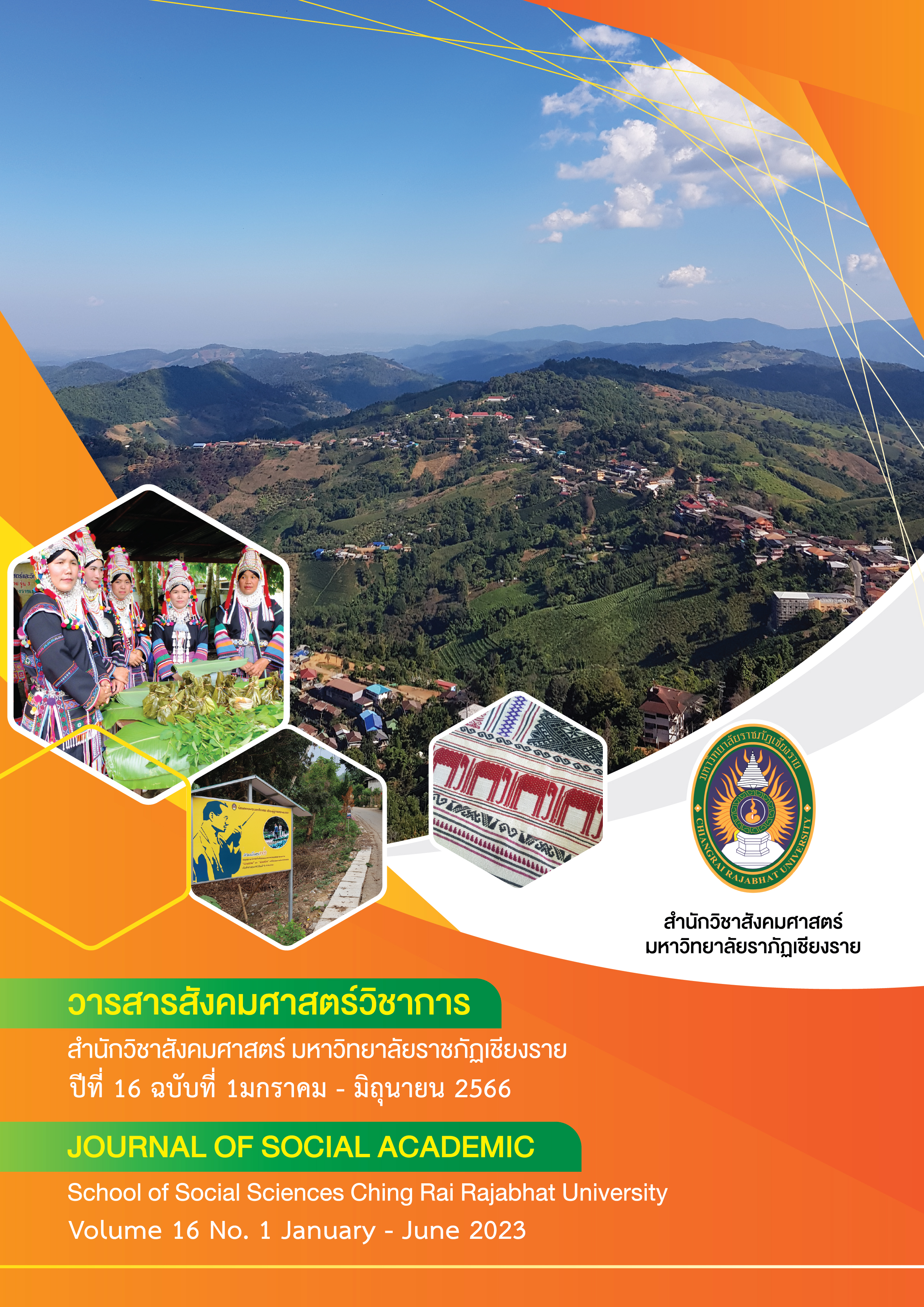สถานภาพการจัดการที่ดินภายใต้นิเวศวิทยาการเมืองของตำบลออนใต้ อำเภอสันกำแพง จังหวัดเชียงใหม่ Status in Land Management of the Community under Political Ecology in OnTai Sub-district, Sankampang District, Chiang Mai Province
Main Article Content
บทคัดย่อ
บทคัดย่อ
บทความวิจัยฉบับนี้มีวัตถุประสงค์คือ ศึกษาสถานภาพการจัดการที่ดินภายใต้นิเวศวิทยาการเมืองของชุมชน ตำบลออนใต้ อำเภอสันกำแพง จังหวัดเชียงใหม่ โดยงานวิจัยนี้เป็นการศึกษาวิจัยเชิงบรรยาย (Descriptive Research) ใช้ระเบียบวิธีวิจัยเชิงคุณภาพ (Qualitative Research) การวิเคราะห์เนื้อหา (Content Analysis) และผสานกับข้อมูลเชิงปริมาณวิเคราะห์ข้อมูลสถิติเชิงพรรณนา เก็บข้อมูลโดยใช้เครื่องมือ แบบสอบถามในระดับครัวเรือน และการสัมภาษณ์เชิงลึก การสนทนากลุ่มย่อยกับตัวแทนผู้ให้ข้อมูล (Key informant)
พบว่าว่ามีปัจจัยที่ส่งผลต่อภาวะปัญหาการจัดการที่ดินของชุมชนที่ส่งผลมากที่สุดอยู่ 2 ปัจจัย ดังนี้ คือ 1)การวางแผนการเงินในครัวเรือนกับสภาวะปัญหาการจัดการที่ดินของชุมชน โดยเฉพาะภาระหนี้สินคิดเป็นร้อยละ 31.2 และ 2)รูปแบบการถือครองกรรมสิทธิ์ที่ดินกับสภาวะปัญหาการจัดการที่ดินของชุมชน คือ สัญญาการเช่าที่ดินระหว่างนายทุนกับชาวบ้าน มีการเช่าที่ดินแบบปากเปล่าถึงร้อยละ 20.9 ทำให้เป็นอุปสรรคต่อการวางแผนการใช้ที่ดินในอนาคต
สถานภาพการจัดการที่ดินของชุมชน โดยใช้ตัวชี้วัดเป็นรูปแบบการมีส่วนร่วมในการจัดการที่ดินของชุมชนออนใต้ คือ การมีส่วนร่วมในการรับผลประโยชน์ (Benefits) และ การมีส่วนร่วมในการประเมินผล (Evaluation) ซึ่งจากการวิเคราะห์ข้อมูลแบบสอบถามพบว่า ชาวบ้านมีส่วนร่วมอยู่ในระดับปานกลางมีแนวโน้มไปทางน้อยซึ่งมีค่าเฉลี่ยรวมเพียง 2.65 และ 2.55 ตามลำดับ เมื่อนำไปวิเคราะห์ร่วมกับระดับการมีส่วนร่วมพบว่า ระดับการร่วมตัดสินใจ ร่วมติดตามตรวจสอบ (Delegated Power) ระดับการควบคุมโดยประชาชน (Citizen Control) อยู่ในระดับที่น้อย จากข้อมูลการสัมภาษณ์และสนทนากลุ่มย่อยกับผู้มีส่วนได้ส่วนเสียคือ ชาวบ้าน นายทุน และตัวแทนจากภาครัฐ พบว่าเงื่อนไขสำคัญที่ส่งผลต่อสถานภาพการจัดการที่ดินภายใต้นิเวศวิทยาการเมืองของชุมชน คือ“สำนึกการเป็นเจ้าของชุมชน”ซึ่งเป็นสำนึกที่มีมากในกลุ่มชาวบ้านแต่ไม่มีในตัวนายทุน และผู้ที่มีบทบาทเป็นตัวกลางประสานระหว่างชาวบ้านและนายทุนก็คือ รัฐ แต่ก็มีผลประโยชน์ทางเศรษฐกิจร่วมกันกับนายทุนในขณะที่ก็จำเป็นต้องปฏิบัติหน้าที่เพื่อชาวบ้านตามภาระหน้าที่ของเจ้าหน้าที่รัฐ จึงเกิดเป็นสถานภาพการจัดการที่ดินภายใต้ความสัมพันธ์เชิงอำนาจ เพราะฉะนั้นการจัดการที่ดินจึงไม่ใช่แค่เรื่องที่ดินเชิงกายภาพเท่านั้นแต่ต้องเข้าใจวงจรระบบนิเวศวิทยาการเมืองของพื้นที่ด้วย
Article Details

อนุญาตภายใต้เงื่อนไข Creative Commons Attribution-NonCommercial-NoDerivatives 4.0 International License.
รายละเอียดของลิขสิทธ์
เอกสารอ้างอิง
Khamthong, C. (1994). Marinization of Farmers in the Forest : A Case Study of Mae Taeng National Forest Reserve, Chiang Mai Province. Chiang Mai University. (in Thai)
Hunnak, C., Nimpanich, J. and n Maintaka, J. (2019). Participation in Land Reform of the Poor and the Disadvantaged: A Case Study of Community Rights in Northeastern Thailand Kasem Bundit Journal 20(2): 31-41. (in Thai)
Cohen. J., M. and Uphoff, N. T. (1977). Rural development participation: concept and measures for project design, implementation and evaluation. New York: Cornell University.
Community Organization Development Institute. (2013). New land management: support for community-.based land management. https://ref.codi.or.th/2015-08-04-10-18- 26/8599-2013-06-16-08-17-18. 1 October 2019. (in Thai)
ChadedKhotcharit, D.T. (2017). Living and Arable Land Management: Case study from Phuech- udom Sub District, Lamlukka District, Pathum Thani Province Journal of Humanities and Social Sciences Valaya Alongkorn 12(2): 299-311. (in Thai)
Phungpracha, E. (2018). “Water Mills”: “Negotiation” in the Context of Political Ecology. Silapakorn University. Bangkok. (in Thai)
J., Jacobson, T. L., & White , S. A. (Eds.). (1996). Participatory Communication for Social Change. New Delhi : Sage.
Tongkachok, K. (2016). People's Participation in Watershed Forest Management in Songkhla Lake Basin. Thaksin University. Songkhla. (in Thai)
Rimthephathip, M. (2017). Participation concept. https://www.gotoknow.org/posts/629862. 10 August 2019. (in Thai)
Kokphol, O. (2009). The Partner Handbook: Public Participation for Local Administrators. Bangkok: King Prajadhipok's Institute. (in Thai)
Suanthong, P. and Thinbangtieo, O. (2019). The Political Ecology of the Coastal Resources Management in Bandon Bay, Surat Thani Province Burapha Journal of Political Economy 7(2): 101-131. (in Thai)
Samranchit, P. (2005). Arable Land and Freedom. Bangkok: Back Lcad Publishing. (in Thai) Rattanamuk, P. (2018). THAILAND 4.0 answers Thailand's needs?. Bangkok: Panichon Printing
House. (in Thai)
Piampongsant, P. (2003). Eco-economics. and political ecology. Bangkok: Chulalongkorn
Printing House university. (in Thai)
Chomphukham, P. (2010). Statistics for research. Faculty of Science, Chiang Mai Rajabhat
University. (in Thai)
Jamrik, S. et al. (1993). Research topics for community forests in the country: a development
approach. Bangkok: Pattana Local News Agency. (in Thai)
Doungnoi, V. (2019). Political Ecology of Conflict and Resistance to Mining of Social Movements Burapha Journal of Political Economy 7(2): 132-152 .(in Thai)
Wisarutphichaya, V. (2000). Rights and liberties under the Constitution of the Kingdom of Thailand 1997. Bangkok: Winyuchon Publishing House. (in Thai)


